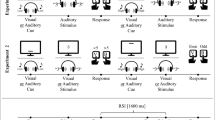Abstract
In task switching experiments participants have to respond to the same set of stimuli while task instructions vary (e.g., digit stimuli are assigned to left- or right-sided key presses by means of magnitude vs. parity classification). Response congruency effects denote worse performance for a stimulus, which is associated with different responses in the two tasks as compared to a stimulus, which is associated with the same response. Previous research suggests that such effects reflect direct links between stimuli and responses acquired in the course of experimental practice. In the current study we investigated the impact of stimulus-specific practice and task instruction by reversing the S–R mapping of one task (Experiment 1) or replacing one task with a new one (Experiment 2) in the second half of an experimental session. Consistent with the direct link account, S–R links practiced during the first half of the experiment largely determined congruency effects despite altered task instructions. Furthermore, the results suggest that previously practiced S–R links (a) can be relatively quickly overwritten by practicing a novel S–R mapping, and (b) are subject to passive decay when no longer in use.



Similar content being viewed by others
References
Allport, A., & Wylie, G. (2000). Task switching, stimulus–response bindings, and negative priming. In: S. Monsell, & J. Driver (Eds.), Control of cognitive processes: attention and performance XVIII (pp. 35–70). Cambridge: MIT Press.
Allport, D. A., Styles, E. A., & Hsieh, S. (1994). Shifting intentional set: exploring the dynamic control of tasks. In C. Umiltà, & M. Moscovitch (Eds.), Attention and performance XV: conscious and nonconscious information processing (pp. 421–452). Cambridge: MIT Press.
Dehaene, S., Bossini, S., & Giraux, P. (1993). The mental representation of parity and number magnitude. Journal of Experimental Psychology: General, 122, 371–396.
Fagot, C. (1994). Chronometric investigations of task switching. Ph. D. Dissertation, University of California, San Diego.
Hoffmann, J., Kiesel, A., & Sebald, A. (2003). Task switches under Go/NoGo conditions and the decomposition of switch costs. European Journal of Cognitive Psychology, 15, 101–128.
Hübner, R. (1997). The effect of spatial frequency on global precedence and hemispheric differences. Perception & Psychophysics, 59, 187–201.
Hübner, M., Kluwe, R. H, Luna-Rodriguez, A., & Peters, A. (2004). Response selection difficulty and asymmetrical costs of switching between tasks and stimuli: no evidence for an exogenous component of task-set reconfiguration. Journal of Experimental Psychology: Human Perception and Performance, 30, 1043–1063.
Kiesel, A., Wendt, M., & Peters, A. (2007). Task switching: on the origin of response congruency effects. Psychological Research, 71, 117–125.
Koch, I., & Allport, A. (2006). Cue-based preparation and stimulus-based priming of tasks in task switching. Memory & Cognition, 34, 433–444.
Lamb, M. R., & Yund, E. W. (1993). The role of spatial frequency in the processing of hierarchically organized stimuli. Perception & Psychophysics, 54, 773–784.
Lien, M. -C., Ruthruff, E., Remington, R. W., & Johnston, J. C. (2005). On the limits of advance preparation for a task switch: do people prepare all the task some of the time or some of the task all the time? Journal of Experimental Psychology: Human Perception and Performance, 31, 299–315.
Meiran, N. (1996). Reconfiguration of processing mode prior to task performance. Journal of Experimental Psychology: Learning, Memory, and Cognition, 22, 1423–1442.
Meiran, N. (2000). Modeling cognitive control in task-switching. Psychological Research, 63, 234–249.
Pashler, H., & Baylis, G. (1991). Procedural learning: 1. Locus of practice effects in speeded-choice tasks. Journal of Experimental Psychology: Learning, Memory, and Cognition, 17, 20–32.
Rogers, R., & Monsell, S. (1995). Costs of a predictable switch between simple cognitive tasks. Journal of Experimental Psychology: General, 124, 207–231.
Rubinstein, J. S., Meyer, D. E., & Evans, J. E. (2001). Executive control of cognitive processes in task switching. Journal of Experimental Psychology: Human Perception and Performance, 27, 763–797.
Schneider, W., Eschman, A., & Zuccolotto, A. (2002). E-prime User’s guide. Pittsburgh: Psychology Software Tools Inc.
Waszak, F., Hommel, B., & Allport, A. (2003). Task-switching and long-term priming: role of episodic S–R bindings in task-shift costs. Cognitive Psychology, 46, 361–413.
Wenke, D., Gaschler, R., & Nattkemper, D. (2007). Instruction-induced feature binding. Psychological Research, 71, 92–106.
Acknowledgment
This research was funded through Deutsche Forschungsgemeinschaft Grant HO 1301/8-3 awarded to Joachim Hoffmann and Grant KL 488/5-3 awarded to Rainer H. Kluwe and Mike Wendt.
Author information
Authors and Affiliations
Corresponding author
Rights and permissions
About this article
Cite this article
Wendt, M., Kiesel, A. The impact of stimulus-specific practice and task instructions on response congruency effects between tasks. Psychological Research 72, 425–432 (2008). https://doi.org/10.1007/s00426-007-0117-3
Received:
Accepted:
Published:
Issue Date:
DOI: https://doi.org/10.1007/s00426-007-0117-3




